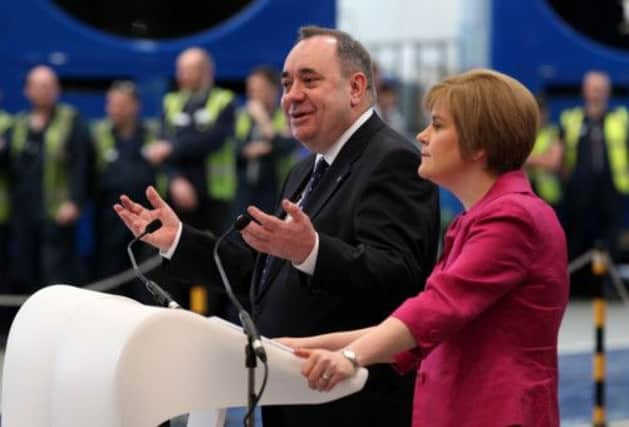SNP ‘not offering’ full Scottish independence


Jim and Margaret Cuthbert, whose work on the Scottish economy has been regularly cited by SNP figures, declare that it is “not feasible that anything approaching independence can emerge from the current referendum”.
Mr Salmond’s eagerness to keep the pound after a Yes vote will bind Scotland in fiscal ties that will radically limit the country’s ability to pursue its own taxation policy, they say. Instead, they describe his plan as a “token version”.
Advertisement
Hide AdAdvertisement
Hide AdThey argue “genuine” independence is required to challenge “vested interests” – from the world of finance, land- owners and the European Union – which they argue have been “flattered and reassured, and . . . protected” by the SNP and are blocking progress in the country.
They also declare that “since real independence is not on offer” in next year’s referendum, a No vote will not settle Scotland’s constitutional dilemma, as the real article will not have been put to Scottish voters.
The pair – who state on their website that they are not “committed to the current constitutional structure of the UK” – have been prominent economists in Scotland for many years.
The SNP has previously backed their work on the UK’s devolution reforms, describing them as “respected economists”.
Last month, they wrote a paper backing a separate Scottish currency as the best way forward for an independent country. They have now contributed to a new book entitled Scotland’s Road to Socialism to set out their views on the constitutional debate in greater depth.
But last night the party said it disagreed with them on this issue, saying Scotland would have 100 per cent control over its finances if people voted Yes.
The Cuthberts argue that change is necessary in a country of growing child poverty, high youth unemployment, and unfair land and wealth distribution. Any reform has to “threaten, and probably displace, some or all of the vested interests which currently hold sway” they add – naming the Crown, the landed interests, finance capitalism, globalised interests and the EU as the main targets.
It is, they argue, “vanishingly unlikely” that any of these interests will be taken on under the Union. Independence would give Scotland the powers to do so, they say.
Advertisement
Hide AdAdvertisement
Hide AdBut they note there is now a “referendum paradox” thanks to the position taken by the SNP, which proposes keeping the pound and the Bank of England, retaining a UK-wide financial regulation system, and staying on with the Queen as head of state. The SNP has also recently backed staying in Nato.
This proposal – dubbed “indy lite” – means that Scottish voters are not being presented with the option of a genuinely independent nation, the pair say.
Their intervention comes with the SNP facing pressure over its claim that Scotland can both keep the pound and enjoy a “monetary union” with the rest of the UK, and have full freedom to do as it pleases on taxation and spending.
The Cuthberts declare: “Something here does not add up. If Alex Salmond were to win a ‘yes’ vote, what he would have would be a mandate to negotiate for the establishment of something far short of any meaningful concept of independence.”
Turning to the talks after a Yes vote on the SNP’s proposals, they add: “Further, in these negotiations Westminster will not even go as far as the current limited vision of independence. If Scotland wants to have the Bank of England as lender of last resort, then Westminster could not possibly agree without binding up Scotland in fiscal ties which would radically limit its right to borrow, or to pursue an independent taxation policy.”
Asked for examples of the restrictions likely to be demanded by Westminster, Dr Jim Cuthbert said last night it was “inconceivable” that the UK government would concede a lower rate of corporation tax in Scotland. The SNP has said it would slash the rate by 3 per cent after a Yes vote.
His comments are supported by the former chief economist of the Scottish Government, Dr Andrew Goudie who, writing in today’s Scotsman, also warns that such flexibility would be “unlikely”.
The Cuthberts argue that the First Minister has made a major error by not taking a more hardline negotiating position in the first place. They argue that only by claiming the full powers of genuine independence – over the ownership of oil assets, for example – would Scotland be able to negotiate from a position of strength.
Advertisement
Hide AdAdvertisement
Hide AdOther left-wing contributors to the book warn that the SNP’s vision will fail to bring about necessary changes. Former Labour MP and MSP John McAllion writes the SNP plan means that the “only real difference will be that we choose to embrace neo-liberalism ourselves rather than having it imposed upon us from the outside.”
However, an SNP spokesman said: “We have great respect for Jim and Margaret Cuthbert, but disagree with them on this aspect. At present the Scottish Parliament controls just 7 per cent of Scotland’s tax revenues.
“By voting Yes, Scotland controls 100 per cent of our nation’s finances, which means we can take the policy decisions necessary to build a fairer society and stronger economy – a position already backed by over 500 business men and women in the pro-independence Business for Scotland group, and by Jim McColl, one of Scotland’s leading job creators.”
He added: “We agree with the recommendation of the Fiscal Commission that there should be a joint fiscal sustainability agreement to govern the level of borrowing and debt within the sterling area – but the reality is that Scotland’s finances are consistently stronger than the UK’s as a whole, and an independent Scotland will always wish to pursue sensible financial discipline.”
SEE ALSO: